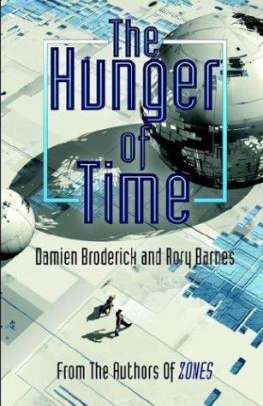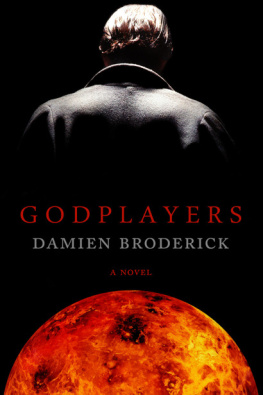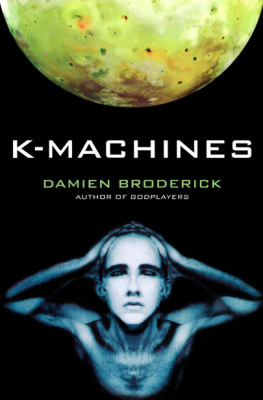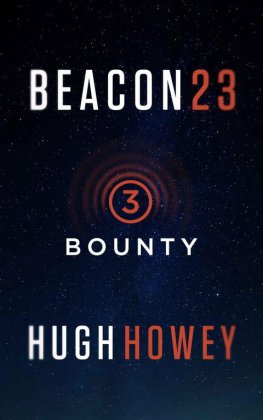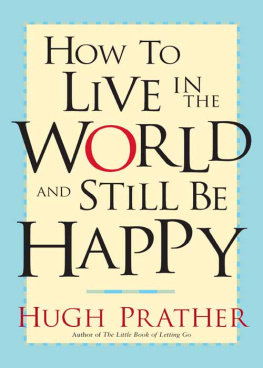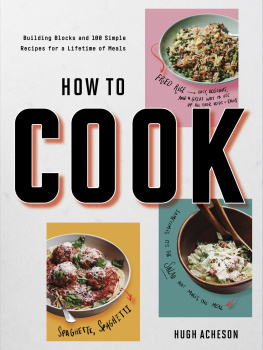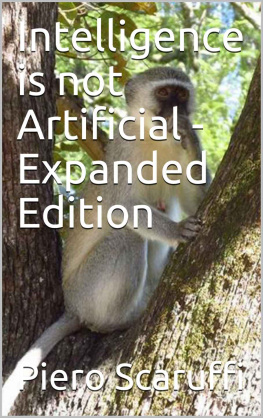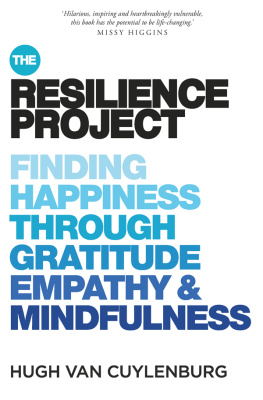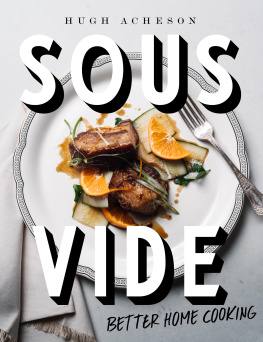The Hunger of Time
Damien Broderick and Rory Barnes
AN [e-reads] BOOK New York, NY
No part of this publication may be reproduced or transmitted in any form or by any means, electronic, or mechanical, including photocopy, recording, scanning or any information storage retrieval system, without explicit permission in writing from the Author.
This book is a work of fiction. Names, characters, places and incidents are products of the authors imagination or are used fictitiously. Any resemblance to actual events or locals or persons, living or dead, is entirely coincidental.
Copyright 2003 Damien Broderick and Rory Barnes First e-reads publication 2003 www.e-reads.com ISBN 0-7592-6600-X
A much shorter and very different version of this novel appeared as Stuck in Fast Forward, HarperCollins, Australia, 1999.
Epigraph from Garrett Kallebergs Limbic Odes, Laird Hunt / Heart Hammer, 1997, by permission of the authors.
Cover art by Anders Sandberg.
"The hunger of time devours the stars"
Garrett Kalleberg
To the memory of Poul Anderson (1926-2001) Science fiction Grand Master for Flight to Forever
Table of Contents
Chapter One
Chapter Two
Chapter Three
Chapter Four
Chapter Five
Chapter Six
Chapter Seven
Chapter Eight
Chapter Nine
Chapter Ten
Chapter Eleven
Chapter Twelve
Chapter Thirteen
Chapter Fourteen
Chapter Fifteen
Chapter Sixteen
Chapter Seventeen
Chapter Eighteen
Chapter Nineteen
Chapter Twenty
Chapter Twenty-One
Acknowledgments
Long time readers of science fiction will appreciate why this novel is dedicated with thanks to the late Poul Anderson, in grateful recognition of his decades of fine and often innovative story-telling. One technique he perfected in sf, both in germinal short work like the 1950 classic Flight to Forever and twenty years later the novel Tau Zero, is to carry both characters and readers by ever increasing leaps forward in time. That method has been adapted here, and it was therefore enormously pleasing to hear from Poul not long before his death that he enjoyed what wed done in the short work that gave rise to this novel.
Thanks, too, especially to Barbara Lamar and Paul Voermans for close readings that materially improved what wed written, and to Spike Jones, Alex Eremenko, Hal Finney and others who helped work out some of the background details. We are grateful to Anders Sandberg, neuroscientist and artist, for his kindness in allowing us to borrow his evocative rendering for our cover. As always, Damiens thanks for continuing support to the Department of English and Cultural Studies at the University of Melbourne, where he is a Senior Fellow.
Fans of cultural theory will recognize phrases, images and ideas appropriated and tormented from their originals in The Golden Bough, W. B. Yeats, Balzac, Samuel R. Delany, James Joyce (Ulysses and Finnegans Wake), but really none of that mattersits all for density and fun. The key idea of the Spike, though, is intended perfectly seriously, and is explored at greater length in Damiens The Spike: How Our Lives are being Transformed by Rapidly Advancing Technology (New York: Forge, 2001).
- Adelaide and Melbourne Damien Broderick and Rory Barnes
One
We think we seek ends, but those come to us unbidden. No, what we search for, all our lives, are beginnings.
Talbot says if the holy war goes on much longer, people will start chucking nukes, I told my family. That sounded like the end of the world to me, or a good enough approximation. Still, I bit my tongue, angry at myself. Tal had walked out on me fully three months earlier. Just left me high and dry. So why the hell did the bastards miserable little obiter dicta keep popping out of my mouth? Actually I knew why. If a major global conflict really did happenand the newspaper editorials, not to mention trash television, made it sound certainthe whole worlds burning would somewhat approximate this last year with my ex-boyfriend. I shuddered, and spread canola margarine on another wholemeal roll.
Certainly my father was convinced the world was about to end, and he wasnt shy about saying so. Grace told him primly that he shouldnt talk about such morbid topics at the dinner table.
I dont believe in hiding the truth from our daughters, Hugh said, no matter how grim it is. Thats how we got into this goddamned fix in the first place.
Hugh, Id rather you didnt use that kind of language in front of Suzanna. Mom pursed her lips, then grinned and punched him in the arm. With Natalie, of course, you can say whatever you fucking well like.
She was a great kidder, but I could tell that she really didnt like any talk about the end of the world. She said it made her nervous and spoiled her appetite. Grace was so lean and muscular from aerobics and Tai Chi classes that she didnt need to be put off her food, because she always ate twice as much as me, which was saying something even though Im on an endless diet and, okay, a few pounds overweight. But I dont care. Im not a slave to fashion, like Suzanna. Thats my sister, the young beautiful one. And no, Im not all twisted up with envy and jealousy.
When I was a child, Id given myself nightmares by skimming the books Father left lying around the living room. Hair-raising stuff from the 1980s when people like Hugh and Grace DAnzso were expecting to be totaled at any minute. Anyway, thats the impression you get. Awful, blood-curdling rhetoric. Let the words creep into the back of your mind and nestle there in the night: Ground zero. First strike capability. Hardened targets. Megatons of explosive nastiness in the multiple-warhead nose cones of missiles launched from attack submarines deep under the Arctic ice or cruising the Pacific. Plus the more recent nightmares: monstrous acts of terrorism, genomic engineered viruses, probably, and god knows what the military were doing in their containment labs with nanotechnology.
Id woken up whimpering that winter morning, too cold to go back to sleep, scrunched up under the non-allergenic comforter. What I wanted was a warm body next to me; I lay shaking in my misery and anger, tears running down my face. It was too early to get up and light the old wood stove. The solar panels werent powerful enough, of course, to warm my parents house, so all they had were basic services like lighting, televisionand the computers, naturally. Cooking and hot water were handled with a blend of 21st century retrofittingugly big drums of water to absorb heat during the daylight hours, rational placement of windows and bushes to catch or shade the Suns heatand 19th century tried-and-true. My parents didnt believe in using the public utilities, like gas and electricity, because you could never tell when the government might decide to turn them off or there could be a drastic oil shortage at any moment. Talbot had agreed for the sake of peace and quiet that these precautions made perfect sense, but my dearest friend Deb often insisted over a cheerful coffee latte and pastry that this was mad bullshit and I suspected she was probably right, but what would I know? (Ha!)
It still scared me. Other people werent forced to suffer this urban survivalist crap. Suzanna and Id had to put up with it since I was small and she was smaller; it had quickly become apparent to me that if other kids parents took such precautions nobody talked about it in the playground, or after school. On the other hand, Suzanna and I hadnt talked about it much either. Its no fun if everyone thinks youre some crazy loon geek with nutso olds, and when you crawl back to live with them at the age of 23 with your tail between your legs after your guy has taken the Toyota and your best friend to a new apartment, and you think youre going crazy with sorrow, its even less fun. Still, there were the occasional moments of hilarity in the madness.

